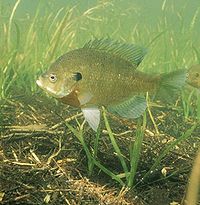Difference between revisions of "Lepomis macrochirus"
From The Aquarium Wiki
m |
|||
| Line 35: | Line 35: | ||
|max_water_hardness=15 | |max_water_hardness=15 | ||
}} | }} | ||
| − | + | ||
| − | + | == Sexing == | |
| − | + | :Mature males have more vivid colours in spawning season. | |
| − | + | ||
| − | + | ||
| − | + | == Tank compatibility == | |
| − | + | :Best kept in large species tanks in a group, or with similar-sized robust North American fish. Smaller fish are likely to be eaten or nipped. | |
| − | + | ||
| − | + | ||
| + | == Diet == | ||
| + | :Bluegills are unfussy eaters, they should be fed high quality pellets or flake and supplemented with foods like [[bloodworm]], shrimp, earthworms, crickets and wingless fruit flies. May also accept some vegetable material. | ||
| + | |||
| + | |||
| + | == Feeding regime == | ||
| + | :Feed once or twice a day. | ||
| + | |||
| + | |||
| + | == Environment specifics == | ||
| + | :Keep this fish in large well-filtered tanks. Planting should be robust as this fish may redecorate and the tank should be dimly lit. | ||
| + | |||
| + | |||
| + | == Behaviour == | ||
| + | :These are shoaling fish, in the wild found in groups of 20-30 or so. | ||
| + | |||
| + | |||
| + | == Identification == | ||
| + | :A dark blue or black "ear" on an extension of the gill cover called the opercular flap and a prominent dark blotch at the base of the dorsal fin, close to the tail. They have typically olive-green backs, with a blue or purplish sheen along the flanks and faint vertical bars may be present along the sides. Breeding males may have more blue and orange colouration on their flanks. | ||
| + | |||
| + | |||
{{Categories | {{Categories | ||
|Category=Fish, Fish (Freshwater), Oddballs, Sunfish | |Category=Fish, Fish (Freshwater), Oddballs, Sunfish | ||
Latest revision as of 03:22, 13 December 2017
Bluegill
Lepomis macrochirus
208 Litres (55 US G.)
19-41 cm (7.5-16.1")
Freshwater
7.0 - 7.5
1 -22 °C (33.8-71.6°F)
10-15 °d
1:1 M:F
8-12 years
Family
Centrarchidae
Contents
Additional names
- Bluegill, Coppernose
Sexing[edit]
- Mature males have more vivid colours in spawning season.
Tank compatibility[edit]
- Best kept in large species tanks in a group, or with similar-sized robust North American fish. Smaller fish are likely to be eaten or nipped.
Diet[edit]
- Bluegills are unfussy eaters, they should be fed high quality pellets or flake and supplemented with foods like bloodworm, shrimp, earthworms, crickets and wingless fruit flies. May also accept some vegetable material.
Feeding regime[edit]
- Feed once or twice a day.
Environment specifics[edit]
- Keep this fish in large well-filtered tanks. Planting should be robust as this fish may redecorate and the tank should be dimly lit.
Behaviour[edit]
- These are shoaling fish, in the wild found in groups of 20-30 or so.
Identification[edit]
- A dark blue or black "ear" on an extension of the gill cover called the opercular flap and a prominent dark blotch at the base of the dorsal fin, close to the tail. They have typically olive-green backs, with a blue or purplish sheen along the flanks and faint vertical bars may be present along the sides. Breeding males may have more blue and orange colouration on their flanks.
External links[edit]
- Fishbase (Mirrors:
 )
)
